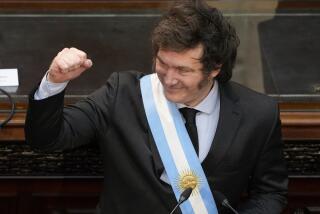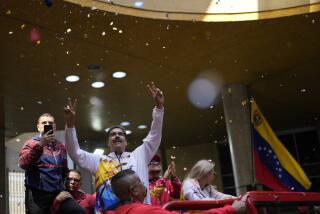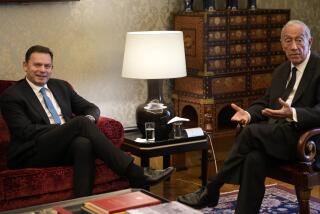Candidates critical of historic peace accord dominate Colombia’s election
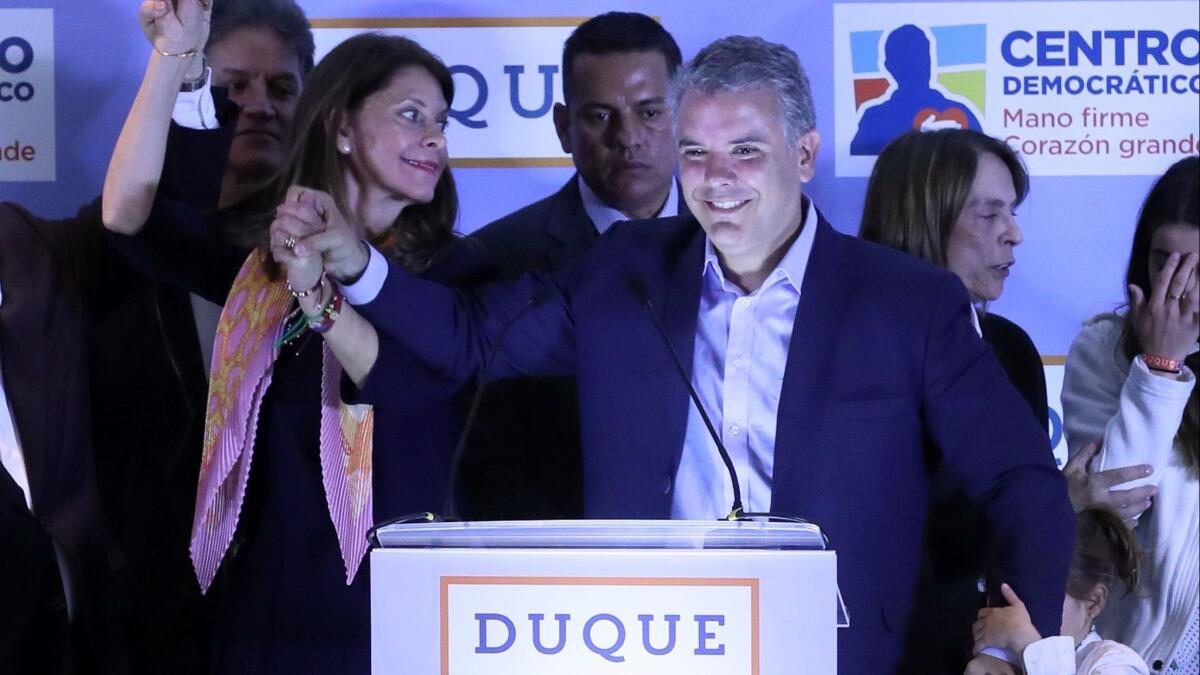
Colombia’s fragile peace deal was under pressure after candidates who have vowed to dismantle portions of the historic accord made strong showings in weekend congressional and presidential primary elections.
Former president and now center-right Sen. Alvaro Uribe won the largest number of votes in his successful reelection bid while his party’s presidential candidate, Ivan Duque, crushed other conservative contenders in the primary portion of the voting.
Both have said the peace deal signed by the government and the Revolutionary Armed Forces of Colombia, or FARC, is too generous to the rebels, particularly justice provisions that set minimal terms for the most heinous of war crimes.
Followers of Nobel Prize laureate and President Juan Manuel Santos and candidates of a rebel party fared poorly. The election marked the first time members of the rebel party had run for office.
Former Bogota Mayor Gustavo Petro also scored big Sunday in his presidential primary. The former M-19 rebel is running as an outsider promising to shake up the political order. Petro’s strength at the polls is a clear sign of Colombian voters’ increasing disenchantment with old-style politics and a seemingly endless string of corruption scandals, said Bruce Bagley, a professor of international relations at the University of Miami.
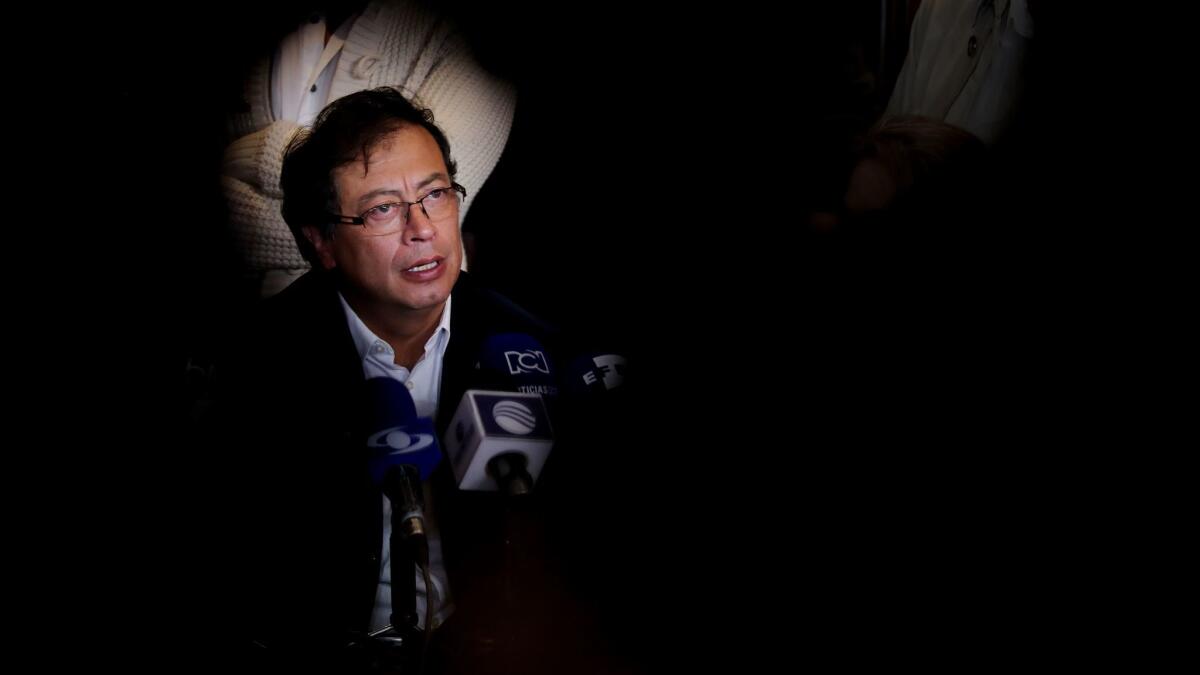
Uribe was president from 2002 to 2010 and remains a powerful presence on Colombia’s political scene, though he is ineligible for another term as president. Uribe founded and leads the Democratic Center faction, which after gains Sunday now has the most seats of any party in the Senate and the second most in the Chamber of Representatives.
The left of center candidate Petro generally supports the peace agreement and has promised to advance social programs to reduce the nation’s social and economic imbalances. Uribe and Duque have accused him of favoring a Hugo Chavez brand of socialism while Petro has countered with accusations that Uribe sponsored right-wing paramilitary violence when he was president.
Duque and Petro lead the polls ahead of the May 27 first round of presidential voting. The top two finishers will meet in a June 17 runoff. No candidate among the dozen expected to run is likely to get a big enough chunk of the votes — 50% plus one — to avoid a second round.
Two other presidential candidates, Sergio Fajardo of the Green Alliance and German Vargas Lleras of Radical Change, were not on the ballots Sunday but still have a chance of making the June 17 runoff, Bagley said, depending on the alliances they forge and their campaigns’ effectiveness.
Perhaps the biggest surprise of the balloting was the poor showing by candidates running under Santos’ U Party banner. Despite the sitting president’s international prestige for having been awarded the Nobel Peace Prize in 2016, he is unpopular at home because of a sluggish economy and rising drug violence. His signature peace agreement was opposed by more than half the population in an October 2016 referendum.
The Santos bloc lost seven seats in the Senate and 12 in the lower chamber, falling to fifth and fourth place, respectively.
Meanwhile, candidates of the FARC, the same initials as the rebel army but now standing as Spanish initials for the Common Alternative Revolutionary Force, made a miserable showing at the polls. Its candidates attracted fewer than 90,000 votes, compared with 500,000 that Senate candidate and party spokesman Carlos Antonio Lozada set as a goal.
Rebranded now as politicians, the former rebels have had difficulty escaping the long shadow left by a half century of killings, kidnappings and extortion, said political analyst Ariel Avila. He said many left-leaning voters chose other candidates they perceived as having better chances of winning.
Terms of the peace deal signed in November 2016 guaranteed the disarmed FARC at least 10 congressional seats — five in the Senate and five in the Chamber — in the 2018 and 2022 congresses. The former insurgents insisted on fielding a slate of candidates this year to demonstrate the grass-roots support they believed they enjoyed.
The FARC’s campaign was also hurt by the withdrawal last week of presidential candidate Rodrigo “Timoleon” Londono, who suffered a heart attack and underwent emergency surgery.
Turnout was 49% of 35 million eligible voters. Colombia’s Defense Ministry declared it the most violence-free election in a half century, largely because FARC was now part of the political process and not an outside agitator.
“This is the first time in my life that I am voting and I am doing it for peace,” said Senate candidate Pablo Catatumbo before casting his ballot on Sunday. He along with Lozada, Ivan Marquez, Victoria Sandino and Sandra Ramirez, who was the partner of late FARC founder Manuel Marulanda, will occupy the five Senate seats assigned to the former rebels by the peace deal.
Kraul is a special correspondent
More to Read
Start your day right
Sign up for Essential California for news, features and recommendations from the L.A. Times and beyond in your inbox six days a week.
You may occasionally receive promotional content from the Los Angeles Times.
